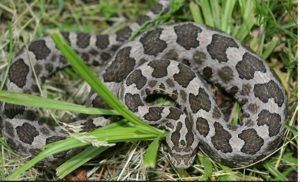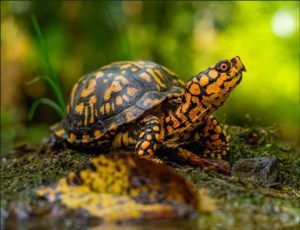Reptiles of Peirce Cedar Creek Institute
Pierce Cedar Creek Institute is an amazing nature center focused on public education and environmental protection. On the 850 acres are native reptiles such as the eastern massasauga rattlesnake and the eastern box turtle. Learn more about these species below.
The Eastern Massasauga Rattlesnake
The eastern massasauga rattlesnake is Michigan’s only venomous snake. It occurs from lower Illinois through Ontario. A relatively shy animal, the eastern massasauga relies on camouflage to evade predators. Thru its black and tan body with brown splotches the snake remains hidden. The preferred habitat for ERMS is in wetlands and the surrounding uplands. Sadly, due to habitat loss across its range, the eastern massasauga was listed as threatened in 2016. Currently, many organizations are monitoring the species and restoring valuable habitats in hopes of rebuilding the population.

The Eastern Box Turtle
Michigan’s only terrestrial turtle is the eastern box turtle. The turtle can be found across the eastern United States. Preferential habitat includes forests with sandy soils next to a water source. Unlike the eastern massasauga rattlesnake, the eastern box turtle stands out. Their shell is a dark brown with small orange-yellow spots on their scutes. The bright coloration continues on their face and arms. Since it is so easily spotted, for defense, the eastern box turtle can close its shell. Unfortunately, habitat degradation is leading to population decline. As a result, the species is listed as vulnerable.
On October 29, MUCC’s OTG program is collaborating with the Pierce Cedar Creek Institute to remove invasive autumn olives and restore important nesting sites for both the eastern box turtle and eastern massasauga rattlesnake. If you are interested in attending click HERE.
The post Reptiles of Peirce Cedar Creek Institute appeared first on Michigan United Conservation Clubs.
Recent Posts



